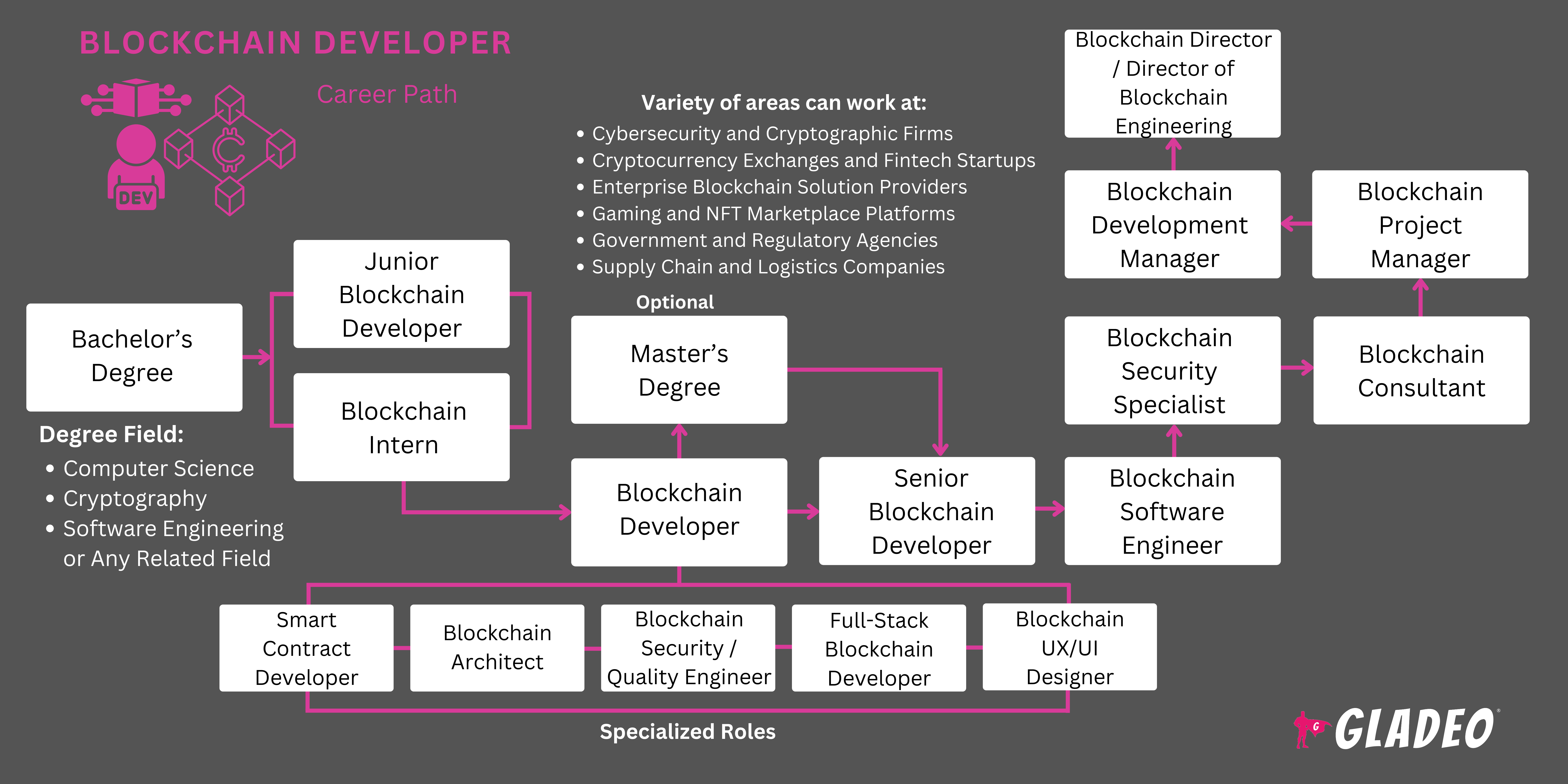聚光灯
Blockchain Engineer, Smart Contract Developer, Blockchain Solutions Architect, Blockchain Software Engineer, Decentralized Application (dApp) Developer, Cryptocurrency Developer, Blockchain Full Stack Developer, Blockchain Architect, Blockchain Consultant, Blockchain Analyst, Blockchain Researcher, Blockchain Tester, Blockchain UI/UX Developer
Imagine that you and your friends like to trade collectible cards. You each have a notebook, and every time a card is traded, everyone makes a note of it in their notebooks. That way, everybody has a written record of every trade. If someone loses their notebook, that’s okay because there are other copies. Also, every note is written in ink and it can’t be changed once it’s written down.
This is basically how blockchain works except everything is done digitally. Blockchain can be used to keep records of just about any kind of transaction, such as sending or receiving money or cryptocurrency, keeping track of files that are being shared, or tracking product shipments.
Blockchain Developers create and maintain secure digital systems that record and verify transactions. They build apps that use blockchain technology to keep records safe, transparent, and tamper-proof. Their work includes designing smart contracts, improving security with encryption, and making sure networks run efficiently by optimizing how transactions are processed. They also work with systems that allow multiple users to agree on transaction records (consensus algorithms), shared digital ledgers, and financial applications that don’t rely on banks (e.g., decentralized finance, or DeFi).
As blockchain technology continues to revolutionize industries such as finance, supply chain, healthcare, and gaming, Blockchain Developers are in high demand. Their work will remain crucial to the creation and shaping of our growing digital economy!
- Creating innovative, decentralized applications that enhance security and transparency.
- Contributing to the development of Web3, digital identity solutions, and decentralized finance.
- Working on cutting-edge cryptographic security measures that reduce fraud.
- Helping companies transition from traditional databases to blockchain-based systems.
工作日程
Blockchain Developers typically work full-time in financial tech firms, tech startups, consulting companies, and enterprise blockchain teams. Some work remotely and some work on a per-project basis.
典型职责
- Design and implement blockchain architecture for decentralized applications.
- Develop and audit smart contracts using Solidity, Rust, or other blockchain programming languages.
- Implement cryptographic security measures, including digital signatures and hash functions.
- Optimize blockchain protocols and consensus mechanisms like Proof of Work (PoW), Proof of Stake (PoS), and Delegated Proof of Stake (DPoS).
- Conduct performance testing and debugging of blockchain nodes and smart contracts.
- Build and maintain APIs that interact with blockchain networks.
- Integrate blockchain solutions into existing enterprise systems.
- Implement tokenization strategies for cryptocurrencies, NFTs, and digital assets.
- Work on Layer 2 scaling solutions such as rollups and sidechains.
- Collaborate with cybersecurity teams to identify vulnerabilities in blockchain applications.
- Stay updated on developments in zero-knowledge proofs, multi-party computation, and quantum-resistant cryptography.
Note, there are several closely related jobs, such as:
- Smart Contract Developer – Specializes in writing, auditing, and optimizing smart contracts for Ethereum, Binance Smart Chain, and other blockchain platforms.
- Cryptographic Engineer – Develops advanced encryption methods, digital signatures, and blockchain security frameworks.
- Blockchain Solutions Architect – Designs end-to-end blockchain frameworks for businesses transitioning to decentralized systems.
- Decentralized Application (DApp) Developer – Builds Web3 applications with blockchain backends and smart contract functionality.
Additional Duties
- Develop blockchain wallets, token standards (ERC-20, ERC-721, ERC-1155), and decentralized exchanges (DEXs).
- Research and apply blockchain interoperability protocols like Polkadot and Cosmos.
- Contribute to open-source blockchain projects and developer communities.
- Educate stakeholders on blockchain use cases and industry best practices.
- Implement regulatory compliance solutions, such as KYC/AML for blockchain applications.
软技能
- 分析性的
- 注重细节
- 沟通
- 创造性
- 批判性思维
- 伦理
- 病人
- 解决问题
- 弹性
- 团队合作
- 时间管理
技术技能
Depending on their specific roles, Blockchain Developers may require expertise in:
- Smart contract development (Solidity, Vyper, Rust)
- Blockchain architecture (Ethereum, Hyperledger, Solana, Avalanche)
- Consensus algorithms (Proof of Work, Proof of Stake, etc.)
- Cryptographic techniques (hashing, encryption, digital signatures, zero-knowledge proofs)
- Token standards and DeFi protocols (ERC-20, ERC-721, ERC-1155, BEP-20, token bridges, liquidity pools)
- API development and blockchain integration
- Cybersecurity best practices in blockchain (smart contract audits, penetration testing, private key management, multi-signature wallets)
- Data structures and storage solutions
- Layer 2 solutions and blockchain scaling methods (rollups, sidechains, state channels, sharding, plasma chains)
- Web3 development tools (Ethers.js, Web3.js, Truffle, Hardhat, Brownie)
- Blockchain node management (setting up and maintaining full nodes, light nodes, validator nodes)
- Interoperability protocols (Polkadot, Cosmos, Chainlink oracles, cross-chain bridges)
- Decentralized storage solutions
- Oracles and off-chain data integration
- Decentralized identity and authentication
- Blockchain-based governance mechanisms
- Programming languages for blockchain (JavaScript, TypeScript, Python, Go, C++, Rust)
- Automated blockchain testing
- Quantum-resistant cryptography
- Cryptocurrency exchanges and fintech startups
- Enterprise blockchain solution providers
- Gaming and NFT marketplace platforms
- Cybersecurity and cryptographic firms
- Supply chain and logistics companies
- Government and regulatory agencies
Blockchain development is not for the faint of heart! The technology evolves rapidly, requiring developers to stay updated on the latest security threats, blockchain forks, and shifting regulations. Unlike traditional software development, there’s little room for error. Once a smart contract is deployed, it can’t be changed, so meticulous testing and security audits are critical.
The decentralized nature of blockchain adds another layer of complexity. Debugging and troubleshooting are time-intensive and there’s no central authority who can revert any mistakes.
Developers often work long hours to ensure networks are secured against the latest threats, especially in high-stakes projects where vulnerabilities could lead to major financial losses. Developers must embrace a steep learning curve, manage pressure from investors and users, and sometimes work under tight deadlines.
For those who thrive in fast-paced, high-stakes, cutting-edge environments, blockchain development might be the job for you!
Decentralized finance (DeFi) is helping to lead the charge as blockchain technology marches forward. DeFi applications let users to trade, lend, and borrow assets without traditional intermediaries, offering greater accessibility and transparency. The sector continues to innovate with decentralized exchanges (DEXs), automated lending protocols, and yield farming strategies, attracting billions in total value locked (TVL). However, security concerns and regulatory scrutiny remain significant challenges as DeFi matures.
Meanwhile, the NFT ecosystem is expanding beyond digital art, fueling demand for smart contract development. NFTs are now being used for music rights, gaming assets, virtual real estate, and even supply chain verification. This growth has led to advancements in blockchain infrastructure, particularly Layer 2 scaling solutions like Optimistic and ZK rollups, which reduce transaction costs and improve network efficiency. These technologies help Ethereum and other networks handle increased demand without compromising decentralization or security.
Beyond finance and digital assets, blockchain interoperability is becoming a key focus. New protocols enable different blockchains to communicate, enhancing efficiency and cross-chain functionality. Simultaneously, blockchain applications are expanding into sectors like healthcare, digital identity, and supply chain management. From securing patient records to verifying credentials and improving logistics transparency, blockchain’s real-world use cases are growing. As the technology matures, broader adoption across industries is expected, supported by regulatory advancements and enterprise adoption.
They may have enjoyed problem-solving, cryptography puzzles, coding challenges, and experimenting with new programming languages. Interest in gaming, cybersecurity, and decentralized technology also aligns well with blockchain development.
A bachelor’s degree in computer science, software engineering, or cryptography is common. Some developers enter the field through bootcamps or self-learning.
Common college courses:
- Cryptography and Network Security
- Smart Contract Development
- Blockchain Architecture
- Distributed Systems
- Algorithm Design
- Data Structures
Certifications:
- Certified Blockchain Developer (Blockchain Council)
- Ethereum Developer Certification (Consensys)
- Hyperledger Fabric Administrator (Linux Foundation)
- Strong computer science and cybersecurity programs.
- Blockchain-focused research labs and industry partnerships.
- Courses on cryptographic protocols, distributed computing, and game theory. Strong GIS, surveying, and remote sensing programs.
- Take advanced math, computer science, and cybersecurity courses.
- Participate in hackathons, coding competitions, and blockchain developer forums.
- Learn blockchain programming through online courses (Coursera, Udemy, Solidity tutorials).
- Follow blockchain industry news and research publications.
- Contribute to open-source blockchain projects on GitHub

- Build a strong portfolio showcasing blockchain projects, smart contracts, and DApps.
- Attend blockchain hackathons and contribute to open-source projects.
- Network at Web3 and crypto conferences like ETHDenver, Devcon, and Consensus.
- Get involved in online communities like Ethereum Stack Exchange and Discord groups.
- Apply for internships at blockchain startups and fintech firms.
- Stay current with industry trends in scaling solutions, cryptography, and security.
- Earn advanced blockchain certifications and security credentials.
- Specialize in zero-knowledge proofs, privacy-focused blockchains, or DeFi security.
- Work towards leadership roles, such as Blockchain Solutions Architect or Smart Contract Auditor.
- Stay updated on emerging Web3 technologies, quantum-resistant cryptography, and AI-driven blockchain solutions.
Blockchain Developers play a vital role in collecting and analyzing high-resolution spatial data to support applications in agriculture, environmental management, urban planning, and infrastructure development. But if this career isn’t the right fit for you, there are plenty of related paths to explore!
- Cryptographic Engineer
- 网络安全分析师
- Smart Contract Auditor
- Web3 Developer
- Fintech Software Engineer
新闻联播

特色工作

在线课程和工具





